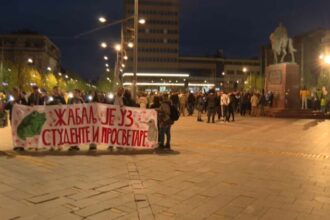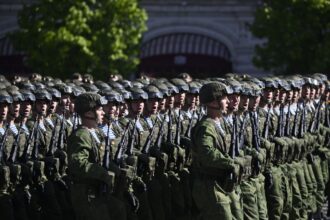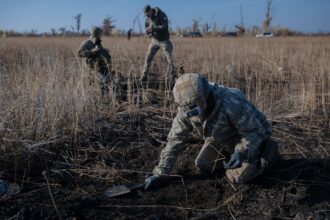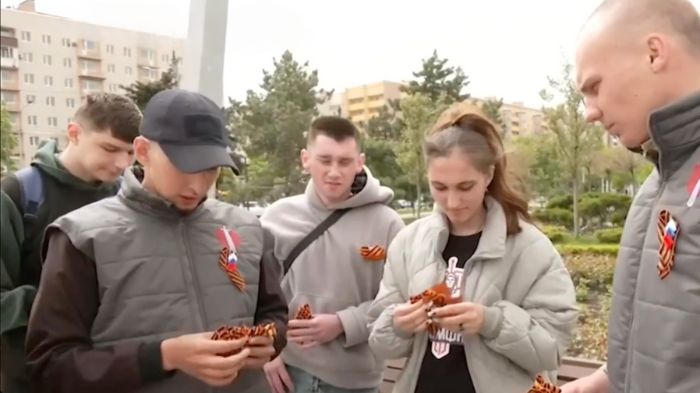Ukrainian teens flee occupied towns because of fear, violence and forced conscription
Ukrainian teens in the occupied territories are driven to leave their homes by fear, deprivation and the threat of violence, or conscription into Russia’s army.
Many Ukrainian teens who live in territories controlled by Russia share this reality. Almenda, an NGO, reports that over 615,000 children of school age live in these territories under dire conditions. The authorities mobilize boys to join the Russian army, send teenagers to “military patriotic camps” to “re-educate”, and give children to Russian parents for adoption. Human rights activists have documented the cases of teenagers who were captured, intimidated and tortured.
Vitalii, 16, from Kherson Oblast, says: “There may not even be a tomorrow.” His perspective was shaped by a pit of pork entrails that Russian forces threw at him during the occupation. Anna, 18 years old, lived under occupation in Russia for a decade and learned “not to speak or ask unnecessary questions.” Inna, 16, is still in “survival” mode in Norway as she was under occupation. Evelin chose Ukraine after ten years of Russian propaganda. She is now adjusting to the fact that she will never return to her hometown.
Some teens have left for government-controlled areas or abroad; others await liberation. Those who remain cannot tell their stories without putting their lives at risk. These accounts give a glimpse of the harsh realities that Ukraine’s youth faced under Russian rule.
Evelin’s journey to Kyiv from occupied Donetsk
Evelin Biankpin, 18, was raised in Donetsk. She was eight years old when Russian forces occupied Donetsk. She left Kyiv for Kyiv a year ago and is now studying Vernadsky Tauride National University which was relocated from Crimea back in 2015.
She shares her story in order to encourage other teens living under occupation to leave. Evelin is fluent in Ukrainian, despite having a Russian and French heritage (her father is from the Ivory Coast).
Her childhood memories of the occupation include the disappearances of her favorite candy and Ukrainian cartoons. She explains that her mother tried to protect her from the war. She quickly realized that her life would never be the same.
Evelin, a student, searched for Ukrainian language and history books in Donetsk. In 2016, Evelin was able to find Ukrainian classics such as Taras Shevchenko’s Kobzar and poems and stories by Ivan Franko, Lesia Ukrainka, and Ivan Franko through friends. The school switched from Ukrainian to Russian. However, Ukrainian lessons continued until 2020 with a Russian-speaking instructor.
“In 9th grade, one of my classmates said he didn’t need Ukrainian. He started turning desks over and screaming loudly. Others joined in. Evelin recalled that the teacher had a nervous break down. She also saw a boy from Kyiv-Raion of Donetsk beaten in intensive care because of propaganda-fueled hate – all due to the fact that he was from a district with the so-called ‘Nazi name’ of Kyiv.
She sought information online after discovering discrepancies between the history textbooks of Russia and the reality. She chose Ukraine despite being offered a place at the Moscow State University. “I knew Moscow would have been easier for me but I refused to go because I didn’t really want to leave,” she says.
She saved money by working in a beauty parlor to move to Kyiv. Donetsk, meanwhile, was “cleared” of locals as Russian officers and their families arrived.
“Prices went way up, and locals started to live worse.” “I got the feeling we were strangers on our own soil,” she says.
Her journey through Russia and Belarus was exhausting and solitary. She switched to Ukrainian in Kyiv as a matter-of-principle.
“It took a while for me to get used to freedom and being safe,” she admits.
Evelin admits that she misses her mother and Donetsk. She also acknowledges the pain at the thought of never returning. She hopes that her experience will inspire other people to choose Ukraine instead of Russia. “Right now it’s important for me surround myself with people who are conscious and willing to work for change.”
Vitalii was held in Russian captivity for ten days
Vitalii, 16, spent eight months in the village Kyselivka near Kherson under Russian occupation. In September 2022, Vitalii and his uncle were taken hostage while on a walk.
“On the 10th of September, we drove past a burned-out military vehicle. Four people in uniforms stopped Vitalii and checked our phones. They accused us of filming military equipment and surrendering positions.
They were taken to “pit” near an gas station filled with what looked like pig intestines. “They kept us in the pit for two hours and threatened to shoot us or throw an explosive into it,” he said. They were then blindfolded and bagged before being separated.
Vitalii, one of 15 prisoners in a cell with a drain and tiled floor, was not given food for four days. He survived on the food that his fellow prisoners gave him. He was not beaten. His uncle was beaten, as were the others. On day six, his uncle and the others were.
On 21 September, the group was released from Kherson’s train stations. Vitalii says, “Later I learned that they were holding us at the Kherson Court of Appeal Building.” After returning to his village, Vitalii stayed inside until Ukrainian forces liberated the village in November.
Vitalii’s fate is still uncertain, despite the relative calm that has returned to Kyselivka. “What do you dream about?” Actually, nothing! I don’t have any special plans. It depends on God”, he says, reflecting his profound impact from his terrifying experiences during the Russian occupation.
Anna spent her childhood during the occupation of Donetsk
Anna (name changed), 18 years old, recently moved from Donetsk and Lviv. She had lived under occupation for almost all of her life. She wants to remain anonymous because she fears for her relatives in Donetsk. Her brother is one of them.
Anna’s childhood was marked by terror. In 2014-2015 constant shelling forced the family into basements. After a shelling, her six-year old friend repeated, “Mommy , mommy .” They found his house in ruins with body parts scattered among the debris. “I realized that something terrible was happening not elsewhere, but right here with us,” she says.
Her experiences highlight the human cost of war. The neighbor who mobilized in the Russian army returned without a limb, questioning Russian narratives: “They lie to us; nothing is really as they say.” Later, he disappeared, probably for his frank remarks.
Anna grew in a close-knit community that was torn asunder when young men were forced into the Russian Army. Many people died, including one friend who was buried alive in a mass grave. “Of course, I don’t consider him a hero, but he is my friend,” she said, reflecting the complex emotions that come with losing friends to an invasion and a cause they didn’t support.
Anna tried to maintain the normalcy despite the occupation. Donetsk is home to cinemas that show pirated films and propaganda. Anna and her friends are amused by the black cloth covering the statue of Taras Shevchenko in the Taras Shchenko cinema. They all knew why and who was being hidden from the public. Anna relied on Telegram and YouTube to get information, avoiding Russian television’s “crude propagandist.”
Her parents supported her when she left, even though her grandmother called it a traitor. Anna believes that older people are incapable of adapting to new things or changing. She estimates that about 20% of the people in Donetsk support Russia, 20% support Ukraine, and the remainder are apolitical.
Anna reflects on her journey from Russia to Lviv and notes that “the first thing I felt when I crossed the border between Poland to Ukraine was hunger. This means I felt safe. “I’m so glad I left home.”
Inna, who survived the Russian occupation, struggles to adapt to Norway
Inna, a 16-year-old girl (name changed), lived for one year in Enerhodar near the Zaporizhzhia Nuclear Power Plant. She describes a life without friends, future plans or school. This illustrates the challenges that teenagers in war zones face.
Inna was initially concerned about minor issues, such as missing swim practice, when she heard the news of the war on 24 February 2022. Days later, Inna was in line at 5 am for bread and felt her feet freeze during “the coldest Winter of my Life.”
On 3 March 2022 Russian troops entered Enerhodar, where tens and thousands of residents, among them Inna’s father, staged a five-hour blockade of protest before being dispersed. Her father, a Zaporizhzhia Nuclear Power Plant (ZNPP) employee, was convinced that Russia was targeting the nuclear plant.
Inna, who lived on the embankment, saw Russian artillery fire at Nikopol every evening. She became antisocial in an attempt to fit into the abnormal norms. She walked the streets despite seeing armed people, public arrests and careful with her words. “The walls can hear everything,” she said.
When apartment searches began in July 2023, her parents decided to leave. ZNPP employees who refused Rosatom contracts were immediately terminated. They drove 8,000 km through Russia, Georgia and Turkiye before choosing Norway.
Inna faces new challenges in Norway. Inna has hysterics when she realizes that food, water and electricity are not enough to live a normal life and do what she wants. She struggles with her identity and self-esteem as a migrant. She feels invisible at her swim club and wants to shout “Hey!” Look, I’m also here!
Inna says, “Don’t Ask…I don’t know what I’ll be doing this evening.” She reflects on the fact that, despite Norway’s 200 years of peace, its citizens cannot truly understand her painful experience.
“No matter what we tell them, they will not understand.” But I don’t want them to understand. “I just want to be noticed!”
As Russia’s brutal occupation of parts of Ukraine continues, a new generation of young people will be forever shaped by war, displacement and exposure to violence and propagandist propaganda.
Related:
How Russian-occupied Ukraine teaches its schoolchildren to hate their homeland
The Ukraine returns 24 children kidnapped by Russian troops from Kherson Oblast
* How Russia deports orphanages, prisons and other institutions from the occupied territories in Ukraine
* Russian occupiers remove Ukrainian language from school curriculum in Zaporizhzhia Oblast
The US Treasury Secretary has said that Russia should pay for the restoration of Ukraine.
UN report accuses Russia war crimes in Ukraine, including torture, sexual violence and murder
* Stolen Childhood: Russian propaganda and militarization against Crimean youth
* Parades and propaganda – how Russia erases the Ukrainian identities of children in Crimea
Read More @ euromaidanpress.com




